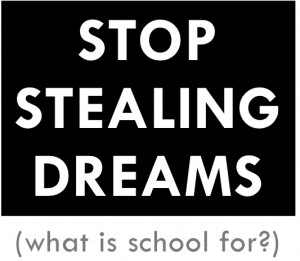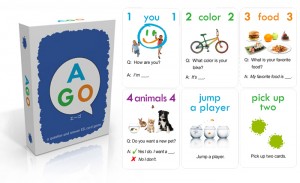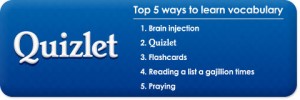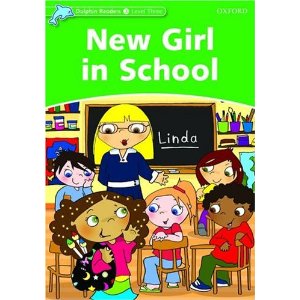blogging curriculum EFL evaluation expectations Language learning teaching testing theory
by sendaiben
leave a comment
Are we stealing dreams?
Seth Godin, who is an internet/new media/publishing/idea guru, just published a manifesto aimed at starting (or continuing) a conversation about the future of education. Very much in the same vein as Ken Robinson’s famous TED talk on the same subject, Stop Stealing Dreams (what is school for?) is a 30,000 word ebook that is currently available for free. Based on his previous work, it’s probably worth your time.
business curriculum expectations iPhone iTunes store presentations self-study teaching technology
by sendaiben
leave a comment
6th grade iPhone app developer -very inspiring
The title above says it all. I would love to see more of my students thinking beyond the education box.
Tip of the hat to Parin.
curriculum EFL eikaiwa ES kids language courses Language learning school management speaking teaching
by sendaiben
4 comments
AGO: the best 900 yen you’ll spend this week
AGO is a card game, similar to UNO or Switchit, that practices simple question and answer patterns. It is ideal for upper elementary or junior high school and above. Students play to get rid of all their cards: the first person to do so is the winner. The game mechanics are easy, and almost all students already know them from playing UNO.
There are eventually going to be three levels: aqua, green, and orange (hence AGO, but I suspect that the pun with eigo was also a factor in naming this product). The first level, aqua, contains very easy questions like ‘do you like…?’ and ‘what season is it now?’. There is some scope for personalization.
The green level just came out at the end of last month, and includes more complex questions, more scope for students to make their own questions, and more ‘game cards’ (‘pick up’, ‘jump’, and so on).
The orange level is due to be released next year.
The production values are pretty good and the cards look and feel great. Well worth the 900 yen, especially if you teach junior high school and up.
business curriculum EFL eikaiwa ES kids language courses Language learning online resources school management self-study teaching vocabulary
by sendaiben
leave a comment
Quizlet may just be what I have been looking for all these years…
For years, I have been looking for a simple, cheap (free?) online tool to allow our younger students to work on their vocabulary outside of class.
Jim George, a friend and fellow school owner, has been going on about Quizlet for a while now, but I didn’t really pay attention until he sent me a detailed email this morning explaining the functionality.
It looks great.
Basically it’s a site that allows people to create and study simple flashcard quizzes online. Free accounts (students) can access content and premium accounts ($15 a year) can create quizzes with words and pictures.
The great thing about it is that as a school we can create study groups and upload content for the students to practice every week. Students can make accounts and join the groups and practice the content for their class. We can also monitor their progress by ‘friending’ them.
It sounds like it has everything we need. I’ll be trying it out over the next few weeks, then I’ll report back with my impressions.
Anyone else use Quizlet?
curriculum Dolphin Readers EFL eikaiwa ES kids language courses Language learning readers Reading Review reviews school management teaching
by sendaiben
2 comments
Dolphin Readers
Dolphin Readers, published by OUP, are strange beasts. I almost didn’t include them in my roundup, because I don’t think they actually are, strictly speaking, readers.
Rather, they are extremely well put-together supplementary workbooks. They consist of five levels (starter and one to four) and there are eight books at each level. The series is available as a set, or individually. There is also a version that includes CDs, although I haven’t heard them so can’t comment.
Each book has two parts, the text and the questions/exercises. You could conceivably try to just use them as readers, but the questions are so well integrated that I think it would be difficult to do that.
My thoughts on Dolphin Readers:
1. the books are very well-designed, printed on thick paper and with attractive artwork
2. they are fairly reasonable: just over 600 yen on Amazon.jp, and less than 20,000 for the full pack of 40
3. the exercises are very well-integrated with the text and practice vocabulary and grammar in a very student-friendly way
4. our students and staff both like the books
Where this series shines is in the classroom. I think the books are designed to be bought by students and used as workbooks in class or for homework. For us, that could get kind of pricey and we already have our students buy a lot of supplementary material, so instead we use the readers in class as a teacher-led exercise where students read the text and answer the questions orally. It’s a great filler activity for those extra three to five minutes that crop up occasionally.
Many people I have talked to prefer the upper levels (three and above), and I agree that they are perhaps more interesting, but I have found all of the books useful. It’s a great resource to have in the classroom.
Any other Dolphin Reader users? I’m very interested in hearing how other people use them too.



